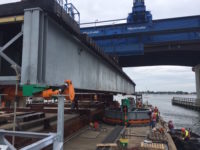Massachusetts Bay Transportation Authority General Manager Steve Poftak says the Boston transportation agency will require more funding and “sustained attention” from senior management to improve safety for the beleaguered system.
Poftak's assessment came at a Dec. 9 MBTA meeting coinciding with release of a 69-page consultant report that criticized the agency for narrowly focusing on capital planning at the expense of operations and safety.
The report, written by three transportation industry experts, including former U.S. Transportation Secretary Ray LaHood, distills more than 100 discussions with MBTA staff, union leaders, federal rail experts and numerous agency contractors, as well as site visits, participation in a live on-site derailment investigation and worker safety training sessions.
MBTA’s approach to safety raises serious safety culture concerns, including deficiencies in required preventative maintenance and inspections, the study found.
The agency’s board convened the safety review panel following a June 11 derailment, just days after once had occurred when a Red Line train jumped the tracks and crashed into electronic signaling equipment, damaging it and injuring one passenger.
Within 76 days, three major incidents had occurred, including the Green Line overspeed derailment, the June 11 Red Line derailment and an Orange Line track fire on Aug. 23 that caused evacuation of a train between stations. “The Red Line and Orange Line incidents can be directly linked to systemic preventative maintenance and inspections and lax quality assurance/quality control oversight,” the report says.
Poftak said the Orange Line fire, similar to the panel’s findings for other incidents, highlights where the T needs to more fully develop its safety culture.
Facing millions of dollars in equipment damage and repair costs, and with riders continuing to complain about delays and unpredictable service, the board’s goal for the panel was to conduct a comprehensive, independent analysis of rail safety at the agency.
The report includes 34 recommendations with 61 corrective actions the panel believes “will set the agency on the path toward implementing a more effective safety management system approach to safety and decrease the frequency and severity of organizational accidents.”
Leadership challenges
Constant MBTA leadership turnover with a record nine new general managers since 2010 has been “incredibly disruptive and has placed the agency in a vulnerable position,” the report says.
Tom White, an independent rail consultant on the MBTA Wachusett extension, says in the past, “managers learned the business from the ground up, starting their careers in train operators, shop mechanics, or maintenance of Way.. That career path is gone. Most rail transit managers [now] come from other industries or originally from a university program not related to rail transportation."
He adds: "In Europe and Asia, dozens of universities have full railroad operations and engineering programs. This approach must be replicated in the U.S., providing a condensed path to the experience that is currently missing.”
The report observes that MBTA commuter rail service operation—outsourced in 2014 to Canadian firm Keolis under an eight-year contract—performs well and “does not face many of the challenges…identified on the transit side of the house.” White says the Federal Transit Administration (FTA), responsible for U.S. rail transit systems that are not part of the national rail network, does not provide the same level of detail for transit operators under current federal rules.
White recalled several severe transit incidents a few years ago, including a Chicago Transit Authority train overrunning the end of the track at O’Hare Airport and climbing an escalator before stopping. “There was some discussion in the industry of the Federal Railroad Administration] assuming authority over rail transit, but FTA asserted that enough improvements would be made,” he says. “FTA regulations are still not as detailed as FRA regulations.”
Urgent Issues
MBTA now is formulating a plan to address panel findings and recommendations.
It has established a tracking framework to address top priority issues within 24 hours, Poftak says. Also, “the agency is adding new safety department positions with key subject matter expertise required to strengthen investigations and ensure that there is capacity to conduct around-the-clock observations, inspection and audits,” he adds.
Poftak plans to report back to the board in February with more specifics regarding response initiatives.




